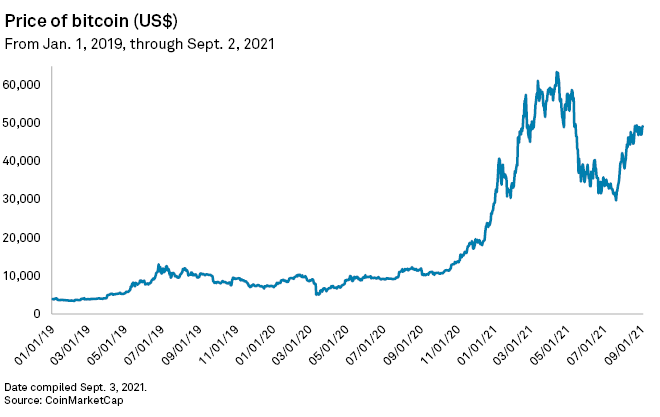S&P Global Offerings
Featured Topics
Featured Products
Events
S&P Global Offerings
Featured Topics
Featured Products
Events
S&P Global Offerings
Featured Topics
Featured Products
Events
Banking & Capital Markets
Economy & Finance
Energy Transition & Sustainability
Technology & Innovation
Podcasts & Newsletters
Banking & Capital Markets
Economy & Finance
Energy Transition & Sustainability
Technology & Innovation
Podcasts & Newsletters
S&P Global Offerings
Featured Topics
Featured Products
Events
7 Sep, 2021

By David Feliba
|
San Salvador, El Salvador - El Salvador President Nayib Bukele speaks at a press conference in February. Source: Camilo Freedman/APHOTOGRAFIA via Getty Images. |
Financial institutions and insurers in El Salvador will likely face increased risks as bitcoin officially becomes legal tender in the country, industry experts said.
On Sept. 7, the Central American country is set to become the first in the world to adopt the cryptocurrency to settle everyday transactions. Under the new law, banks and businesses have to accept Bitcoin as payment for obligations, provided that they have the necessary technological capacity to process it. Salvadorians will also be able to pay taxes in bitcoin.
Credit rating agencies are concerned that, with many aspects of the new legislation still unclear, the law could expose financial institutions to cyberrisks, potential violations of anti-money laundering standards and the volatility of the price of bitcoin.
The financial sector has had just three months to prepare for the impact that such a regulatory move could have, since El Salvador's Congress approved the Bitcoin Law on June 9.
"Three months is a relatively short period of time for such an important paradigm change," Jesús Sotomayor, a bank analyst with S&P Global Ratings, said. "It is still difficult to gauge the real impact that it will have."
Both Fitch and Moody's qualified the Bitcoin Law as credit negative for the sector. "Monitoring compliance and controls associated with Know Your Customer and anti-money-laundering guidelines is likely to be difficult," Moody's said in its report.
These challenges, the rating agency noted, "might jeopardize confidence in the banking system."
A slow start expected, with limited support
The adoption in the upcoming weeks is expected to be gradual as the vagaries of the law that analysts point to are better defined. The law establishes a government-sponsored bitcoin-U.S. dollar convertibility framework that has not yet been fully explained.
President Nayib Bukele's push to adopt Bitcoin as legal tender has astounded many Salvadorians, and protests have taken place across the country over the past weeks against the implementation. In a June survey by the national retail and industry chamber, 96% of the businessmen consulted said they did not want to be obliged to accept bitcoin.
"In the context of an unpopular measure, which could shutter [Salvador's] access to international credit and which technical staff is saying that it is not a good idea, why go ahead?" Ricardo Castaneda, a senior economist in local think tank ICEFI, said in an interview.
The Bitcoin Law, a two-page document with 16 articles, does not clarify several aspects of its implementation and shows "how improvised [adoption] has been in El Salvador," according to Castaneda.
Bitcoin experiment underway
But the government is moving ahead with its plan. On Aug. 17, the central bank of El Salvador published a technical document further regulating the rollout.
In addition, the government has created its own digital wallet, Chivo, which could result in competition for banks' payment business and other fee services tied to remittances.
As part of the rollout, El Salvador plans to install some 200 ATMs throughout the country, as well as 50 "Chivo points," where citizens may be assisted. Salvadorians who download the government sponsored Chivo wallet, will be awarded $30 in bitcoin.
|
San Salvador, El Salvador Source: APHOTOGRAFIA via Getty Images. |
On social media, President Bukele accused the opposition of "spreading fear" among the population about the possible impact of the Bitcoin Law for the country. He argued that enabling bitcoin payments will attract investments, foster inclusion and contribute to lower financial costs on remittances.
S&P Global Market Intelligence approached El Salvador's finance ministry for comment, but it did not respond before publication of the story.
Deposits in the financial system ticked down slightly in June, with some $70 million withdrawn from the banking system, or around 1.4% of total deposits, according to central bank data. When the law was approved, the banking association ABANSA said it was "respectful" of the legislation and that it awaited further notice on the operational framework.
"Bukele has all the power [and] there is not really much we can do," Luis Membreño, a Salvador-based economist, told S&P Global Market Intelligence.
Meanwhile, international multilateral agencies have been critical of Bukele's initiative and have not been willing to cooperate.
The World Bank has refused to help El Salvador with the rollout, citing concerns over transparency and the environmental impact of Bitcoin mining. In addition, the International Monetary Fund said in a blog post that establishing crypto-assets as national currency was a "step too far."
For the country, which is running a deficit and increased debt levels as a result of the COVID-19 crisis, being on good terms with the IMF remains relevant. El Salvador is currently in talks with the IMF over a $1 billion loan, which some believe could be jeopardized as a result of the implementation.
In July, Moody's downgraded Salvadorian debt with a negative outlook, arguing that the Bitcoin Law reflected "weaker governance" in the country and that it would likely compromise the IMF deal.
"[The] Bitcoin Law must be repealed," ICEFI's Castaneda said. He argued that El Salvador "is not prepared" and that the adoption of cryptocurrency as legal tender would require some kind of international backing for it to take off.
Otherwise, he said, it is like "jumping into the void without a parachute. You may be lucky enough to land on your feet, but chances are that things won't work out."

Increased risk for banks
But even if the implementation will be gradual, as analysts believe, it is highly likely that banks will face mounting risks.
"Banks do not want direct exposure to bitcoin," S&P Global Ratings' Sotomayor said. Banco Agrícola SA, which is owned by Bancolombia SA, recently established an internal system which mitigates volatility risk by automatically converting bitcoin to U.S. dollars or other currencies.
But whereas large banks with investment capacity and robust infrastructure can adopt these internal measures, it remains to be seen whether smaller banks will be able to do so.
"Salvadorian banks hold government debt in their balances. What would happen to banks if they are forced to take bitcoin as pay?" Castaneda said.
For rating agencies, the greatest risk comes from international reputation and factors related to money laundering. Local banks could be subject to greater scrutiny and increased operational costs.
"Correspondent banks could require more detailed due diligence and checks on El Salvador's financial institutions if regulations and controls are not robust enough to avoid tax evasion, money laundering and terrorist financing," Fitch said in a note.
On top of that, volatility might discourage banks from holding bitcoin. In a note, Moody's said that "effective and timely conversion" of bitcoin balances will be key to mitigating exposure.
However, should Salvadorians choose not to adopt it, risks for lenders would be promptly mitigated. "People will want to get rid of bitcoin as soon as possible," Membreño said.
Bukele's government has stated that, among its many objectives, promoting financial inclusion in the country was a major target. But so far, the government has not clearly outlined the type of infrastructure investment it will implement to allow businesses to operate.
"70% of all businesses in El Salvador are informal and have little access to tech," Membreño said. "Even if the government really wants to, it will be very difficult to implement."
